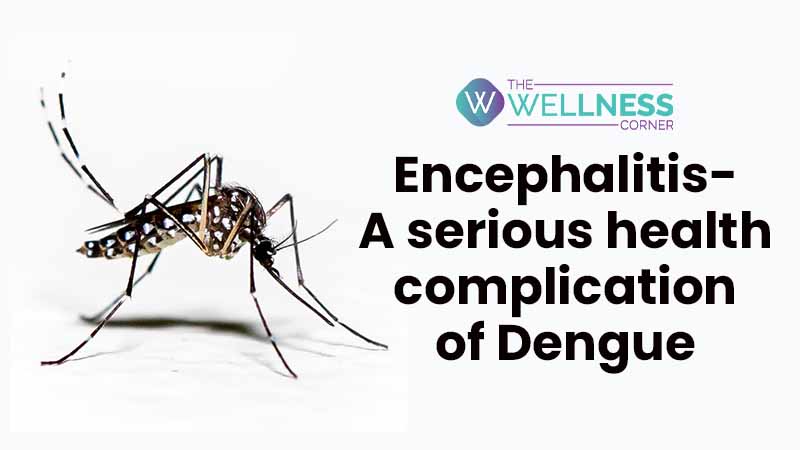Encephalitis: A serious health complication of dengue
- 40 months ago
Did you know encephalitis is related to dengue? Well, if you did not but are curious, this blog is for you. Here we'll discuss what encephalitis is, how it is related to dengue, and its symptoms. So, let's get right into it.
What is encephalitis?
It's a condition that leads to inflammation of your active brain tissues. This inflammation causes mental confusion, light sensitivity, neck stiffness, and headaches. Encephalitis is mostly triggered by an autoimmune response or a viral/bacterial infection.
What are the causes of encephalitis?
Basically, there are two types of encephalitis: Infectious Encephalitis and Autoimmune Encephalitis. Both these types have different causes, which are discussed below:
Infectious Encephalitis
Viral infections cause infectious encephalitis. Although the vaccines for measles, chickenpox, mumps, etc., have reduced the rate of infectious encephalitis, some viruses can still cause this disease.
Some mosquitoes, ticks, and other insects carry viruses that can lead to encephalitis. Here are some examples:
- Japanese encephalitis virus
- West Nile virus
- La Crosse virus
- Equine viruses
- St. Louis virus
- Powassan virus
- Chikungunya
- Zika
Autoimmune Encephalitis
This type of encephalitis occurs when your own cells or antibodies start attacking healthy brain cells. The cause of this type isn't quite known. However, it's likely that cancerous tumors or some sort of infection cause this type of encephalitis.
Why are the symptoms of encephalitis?
Most symptoms of encephalitis are physical. However, as it impacts your brain health, there are some cognitive symptoms as well. Read along tin find what they are:
Physical Symptoms
- Seizures
- Fever
- Headache
- Sensitivity to Light
- Movement Issues
- Sensitivity to Sound
- Loss of Consciousness
- Neck Stiffness
In some extreme cases of encephalitis, you may also see:
- Impairment of speech or hearing
- Partial Paralysis or Weakness in the Arms and Legs
- Double Vision
- Coma

Let's move towards the cognitive or neurological symptoms.
Neurological/Cognitive Symptoms
- Confusion and Disorientation
- Excessive Sleepiness
- Irritability
- Psychosis
- Anxiety
- Hallucinations
- Behavioral Changes
- Memory Loss
- Cognitive Impairment
These were almost all the symptoms you might notice in a person suffering from encephalitis. But why is it so important to know about all or most of these symptoms? Well, here's why:
Why is it important to know the symptoms of encephalitis?
Encephalitis is quite a complex condition. For about 40-50% of the cases of this condition, the cause is unknown. It's hard to anticipate how this condition will face different individuals.
Also, sometimes, diagnosing this condition can become hard, leading to severe, irreversible conditions and even death. However, if diagnosed in time, it can be treated, and the individual can be saved from any long-lasting effects. And you can diagnose only if you're aware of the symptoms.
It's the reason knowing the symptoms and signs of encephalitis is quite important.
Can the dengue virus lead to encephalitis and impact your brain?
Dengue is an acute disease (viral) transmitted by the Aedes mosquito. It's known for causing fevers and attacks the platelets and WBCs, leading to poor overall immunity. However, with the proper diet and some common medications, it can be treated.
However, as per a study, dengue is also associated with several neurological complications such as:
- Acute viral myositis
- Opsoclonus-myoclonus syndrome
- Myelitis
- Disseminated encephalo-myelitis
- Brachial neuritis
- Encephalopathy
- Guillain Barre syndrome
- Hypokalemic paralysis
- Myositis
According to another study, dengue can lead to asymptomatic infection and dengue shock syndrome. Although neurological complications aren't commonly seen in dengue, they might still lead to encephalopathy, meningitis, Guillain-Barré syndrome, and encephalitis in extreme cases.
Although it happens rarely, encephalitis is a serious complication of dengue and can be potentially fatal if it is not diagnosed at an early stage and managed appropriately. Therefore if some individual is having dengue infection and has signs and symptoms consistent with encephalitis then the patient should be shifted to hospital immediately for medical treatment under specialist supervision.
How can early detection of dengue potentially save a life?
Dengue, as you may know, majorly attacks your WBCs and Platelets. WBCs help fight infections, and platelets help in blood clotting. If the number of WBCs is less than what's required, you'll become prone to infections, and even the common cold could be dangerous.
And low platelets mean the blood clotting will be slow. For instance, if you get injured during dengue, you'll lose more blood than regular, which can be fatal.
Fortunately, if dengue is symptomatic and is diagnosed early, it's not life-threatening. Common symptoms of dengue fever include:
- Weakness or Fatigue
- Fever
- Vomiting
- Indigestion
- Low immunity
- Body Aches
Also, a simple test can help you determine whether or not you're suffering from dengue. And if you are, you can:
- Buy prescribed medications for fever and body aches. (As there's no specific medicine for dengue)
- Consume Kiwi, dragon fruit, coconut juice, sweet lime, etc.
- Rest and try to increase your platelets and WBCs.
This way, you can protect yourself from the severe consequences of Dengue fever. However, to do so, an early diagnosis is necessary.
Wrapping Up
Dengue is a pretty common viral infection in the tropical regions of India. Although it's easily treatable, some extreme cases might lead to encephalitis. So, it is always recommended that you reach out to the doctor if you experience any of the above symptoms. This way, you can prevent the chances of complications of dengue fever.








